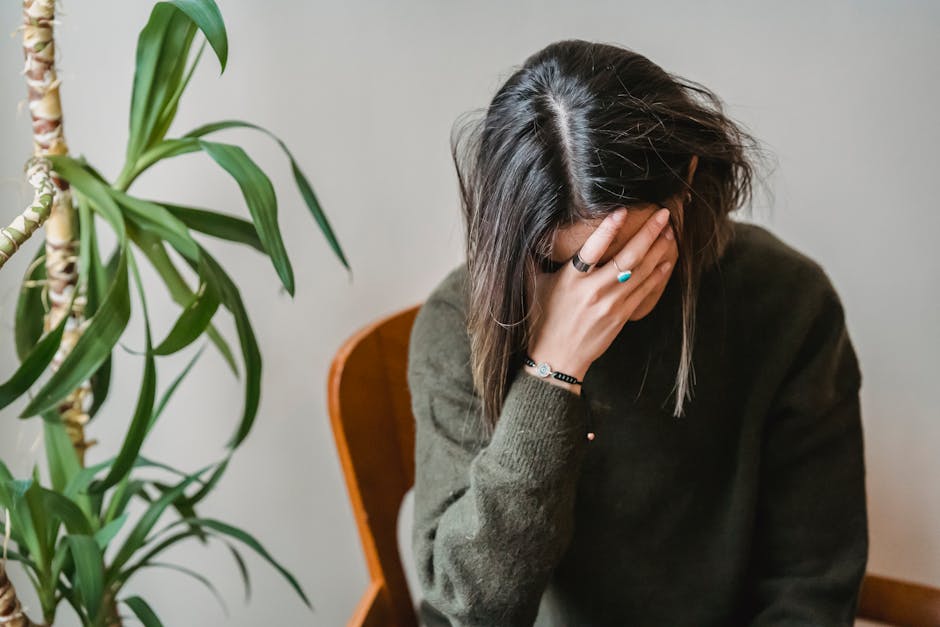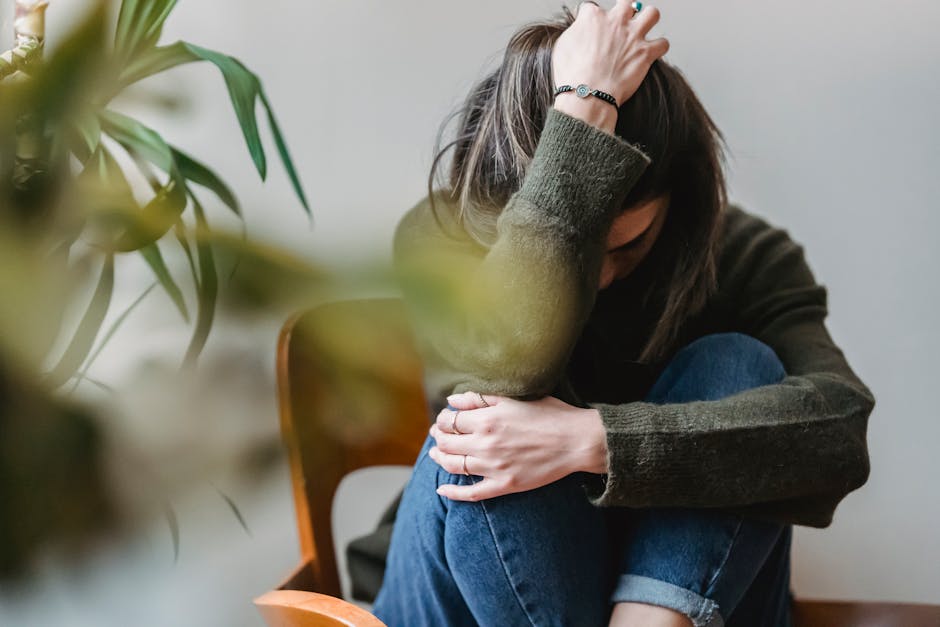Feeling anxious can be like riding a rollercoaster you never intended to get on. Your heart races, your palms sweat, and your mind runs at a million miles an hour. But what if you could find the emergency brake for this ride? Stick around, because you’re about to discover some effective ways to calm your body from anxiety, and why mastering these techniques could be a game-changer for your overall well-being.
Key Takeaways
- Understanding anxiety as a natural response and identifying your triggers can help manage it.
- Breathing and relaxation techniques are powerful tools for immediate anxiety relief.
- Lifestyle adjustments, including diet and exercise, contribute to long-term anxiety management.
- Cognitive and emotional strategies can reframe anxious thoughts and feelings.
- Sensory and social techniques offer additional comfort and support.
- Incorporating humor, mindfulness, and tactile methods can provide quick and enjoyable anxiety relief.
- Professional help is a valuable resource for those struggling to manage anxiety on their own.
Understanding and Accepting Anxiety
Recognize Anxiety as a Natural Response
Anxiety isn’t just a nuisance; it’s a built-in alarm system. It’s your body’s way of telling you to be alert to danger. But when that system is a little too sensitive, it can go off without a real threat, leaving you feeling overwhelmed and stressed.
Identifying Triggers
To calm your body, start by playing detective. What sets off your anxiety? Is it a looming deadline, a crowded space, or maybe an upcoming social event? Pinpointing what triggers your anxiety is the first step in managing it.
The Importance of Acceptance
Accepting that you’re feeling anxious, rather than fighting it, can paradoxically lessen its grip on you. It’s like quicksand; the more you struggle, the deeper you sink. Acceptance is your solid ground.

Breathing and Relaxation Techniques
Deep Breathing Exercises
Diaphragmatic Breathing
This is a fancy term for deep belly breathing. It’s about breathing deeply into your diaphragm, not just your chest, to reverse the ‘fight or flight’ response and trigger your body’s natural relaxation response.
Progressive Muscle Relaxation
Tense and release each muscle group in your body, starting from your toes and working your way up. This can help you spot where you’re holding tension and consciously let it go.
Visualization Techniques
Guided Imagery
Picture a scene that’s calming for you—maybe a beach at sunset or a quiet forest. Guided imagery can transport you there, away from the stress of the moment.
Visualize Peacefulness
Create your own mental safe haven. What does peace look like to you? Hold onto that image when anxiety strikes.
Meditation and Yoga
Both practices can help you focus on the present moment, rather than worrying about the past or future. They’re like a workout for your mind, building strength and flexibility.

Lifestyle Adjustments to Reduce Anxiety
Avoiding Stimulants
Limiting Coffee and Alcohol
Stimulants like caffeine and alcohol can exacerbate anxiety. Cutting back can help keep your nervous system from going into overdrive.
Physical Activity
‘Burn Off’ Anxiety with Exercise
Physical activity releases endorphins, which are natural mood lifters. Even a brisk walk can help clear your mind and reduce stress.
Simple Stretches
Stretching can release muscle tension, which often accompanies anxiety. It’s a quick and easy way to help your body relax.
Dance it Out
Sometimes, you just need to shake it off. Dancing can be a fun way to release pent-up energy and stress.
Sleep Hygiene Practices
A good night’s sleep is like a reset button for your brain. Establishing a regular sleep routine can help you wake up feeling more rested and less anxious.
Balanced Nutrition
What you eat affects how you feel. A balanced diet can stabilize your energy and mood, keeping anxiety at bay.
Regular Exercise Routine
Consistent exercise can reduce anxiety in the long term. It’s about finding a routine that works for you and sticking with it.

Cognitive and Emotional Strategies
Questioning and Challenging Thoughts
Change Your Language
The words you use can influence how you feel. Instead of saying “I can’t handle this,” try “I’m feeling anxious right now, but I’ve gotten through this before.”
Use of Distractions
Engage in Activities
When your mind is racing, redirect your focus. Engage in an activity that requires your full attention, whether it’s a puzzle, a craft, or cooking a new recipe.
Listen to Music or Make a Playlist
Music can be incredibly soothing. Create a playlist of songs that lift your spirits or calm your nerves.
Watch Funny Videos
Laughter is a powerful antidote to anxiety. A few minutes watching your favorite comedian or cute animal videos can lighten your mood.
Expressing Feelings
Talk to Someone Trusted
Sometimes, just talking about what you’re feeling can take the weight off your shoulders. Reach out to a friend, family member, or therapist.
Write it Down
Journaling can help you process your thoughts and feelings, making them less intimidating.
Name What You’re Feeling
Putting a name to your emotions can make them more manageable. It’s the difference between a vague sense of unease and knowing you’re just feeling nervous about a specific event.

Sensory and Social Techniques to Calm Anxiety
Aromatherapy
Scents like lavender and chamomile can be calming. Consider using essential oils or scented candles to create a relaxing atmosphere.
Acupressure and Pressure Points
Applying pressure to certain points on your body can relieve tension and promote relaxation. It’s like having a stress relief button at your fingertips.
The 5-4-3-2-1 Coping Technique
This technique involves identifying five things you can see, four you can touch, three you can hear, two you can smell, and one you can taste. It’s a grounding exercise that can bring you back to the present moment.
Social Support
Seek Social Support
Connecting with others can provide comfort and reassurance. Don’t underestimate the power of a supportive community.
Spend Time with a Pet
Animals can be great anxiety relievers. Spending time with a pet can lower stress and bring joy to your day.
Environmental Changes
Get Some Fresh Air
Sometimes, a change of scenery is all you need. Step outside and take a few deep breaths of fresh air.
Take a Cold Shower or Ice Plunge
The shock of cold water can be invigorating and help snap you out of anxious thoughts.
Additional Tools and Activities
Mindfulness and Grounding Exercises
The “File It” Mind Exercise
Imagine filing away your worries in a cabinet or box. It’s a way to mentally put them aside and focus on the present.
Humor and Laughter
Think About Something Funny
Recall a hilarious memory or joke. It can be a quick way to shift your mood.
Tactile Methods
Chew Gum
Chewing gum can be a surprisingly effective way to reduce anxiety. It’s a simple action that can help distract your mind.
Squeeze a Stress Ball
Having something to squeeze can release tension and give your hands something to do other than fidget.

Professional Help and Self-Care
Consider Therapy
If anxiety is a frequent visitor in your life, talking to a professional can help. Therapists can provide strategies tailored to your needs.
Self-Care Routines
Establishing a self-care routine can help you maintain a sense of calm and control in your life. It’s about doing things that make you feel good, whether that’s reading, taking baths, or spending time in nature.
When to Seek Immediate Care
If your anxiety feels overwhelming or is accompanied by thoughts of self-harm, it’s important to seek immediate help. You’re not alone, and there are people who want to support you.
Anxiety can be a tough opponent, but with these strategies, you have a toolkit at your disposal to help calm your body and mind. Remember, it’s okay to ask for help, and taking steps to manage your anxiety is a sign of strength, not weakness. For more insights on managing anxiety, explore these resources on natural ways to relieve panic attacks, strategies for managing anxiety and panic attacks, and ways to de-stress and reduce anxiety. With practice and patience, you can find your calm amidst the chaos.
Soothe Your Mind: Navigating the Waves of Anxiety – FAQ
What are some quick techniques to calm anxiety?
Quick techniques to calm anxiety include deep breathing exercises, such as the 4-7-8 method, where you inhale for 4 seconds, hold your breath for 7 seconds, and exhale for 8 seconds. Progressive muscle relaxation, where you tense and then relax different muscle groups, can also be effective. Additionally, grounding techniques like the 5-4-3-2-1 method, which involves identifying things you can see, touch, hear, smell, and taste, can help bring you back to the present moment.
Can physical exercise help reduce anxiety?
Yes, physical exercise can significantly reduce anxiety. Regular exercise releases endorphins, which are natural mood lifters. It also helps to take your mind off worries, reduces tension in the body, and can improve sleep. Activities like brisk walking, running, swimming, or yoga can be particularly beneficial for managing anxiety.
How does diet affect anxiety levels?
Diet can play a crucial role in managing anxiety. Consuming a balanced diet with a good mix of fruits, vegetables, whole grains, lean protein, and healthy fats can help stabilize blood sugar levels and mood. Limiting caffeine and alcohol, which can exacerbate anxiety symptoms, is also recommended. Staying hydrated is important as dehydration can cause mood changes.
What role does sleep play in managing anxiety?
Sleep is vital for managing anxiety as it allows the brain to rest and recharge, helping to regulate mood and improve brain function. Lack of sleep can exacerbate anxiety symptoms. Establishing a regular sleep routine, creating a comfortable sleep environment, and avoiding screens before bedtime can help improve sleep quality.
Can mindfulness or meditation help with anxiety?
Mindfulness and meditation can be very effective in managing anxiety. These practices help you stay focused on the present moment, reducing the tendency to ruminate on past events or worry about the future. They can also lower stress levels, improve concentration, and enhance overall emotional well-being.
Should I talk to someone about my anxiety?
Talking to someone about your anxiety can be a helpful step in managing it. Sharing your experiences with friends, family, or a mental health professional can provide support, understanding, and potentially new coping strategies. Therapy, such as cognitive-behavioral therapy (CBT), can be particularly effective in treating anxiety disorders.
Are there any natural supplements that can help with anxiety?
Some natural supplements, such as omega-3 fatty acids, green tea extract, valerian root, and chamomile, have been suggested to help with anxiety. However, it’s important to consult with a healthcare provider before starting any supplements, as they can interact with medications and may not be suitable for everyone.
How can I prevent anxiety from affecting my daily life?
Preventing anxiety from affecting daily life involves a combination of strategies, including regular exercise, a healthy diet, adequate sleep, mindfulness or meditation, and possibly therapy. Learning to recognize and challenge anxious thoughts, and developing a set of coping skills, can also be beneficial. It’s important to create a routine that includes time for relaxation and self-care.
Is it normal to experience anxiety?
Yes, experiencing anxiety is a normal part of life. It’s a natural response to stress or danger and can be beneficial in some situations by increasing alertness and preparedness. However, when anxiety becomes frequent or overwhelming, it may be indicative of an anxiety disorder, and seeking professional help is advised.
When should I seek professional help for my anxiety?
You should seek professional help for anxiety if it is persistent, seems uncontrollable, interferes with your daily activities, or causes you significant distress. A mental health professional can assess your symptoms and provide appropriate treatment, which may include therapy, medication, or a combination of both.



